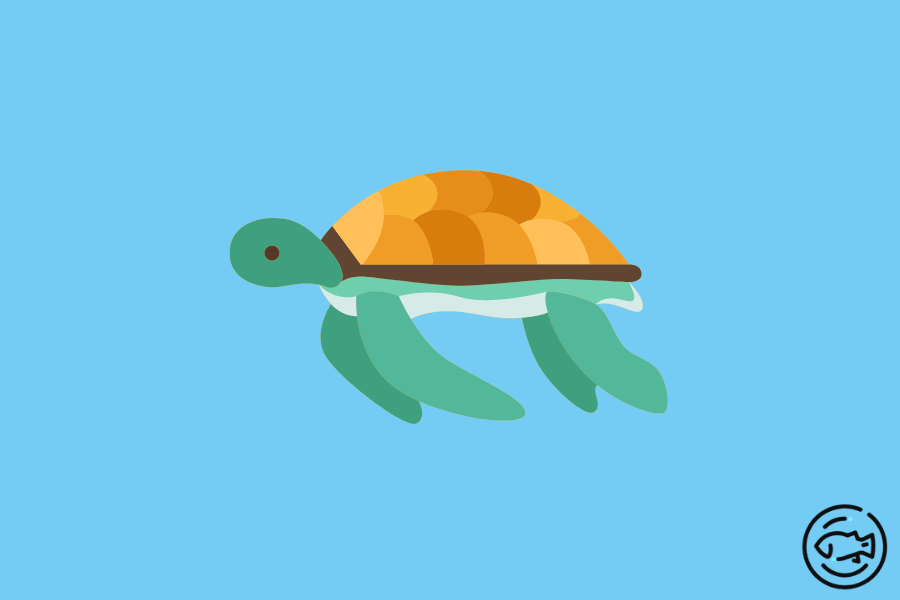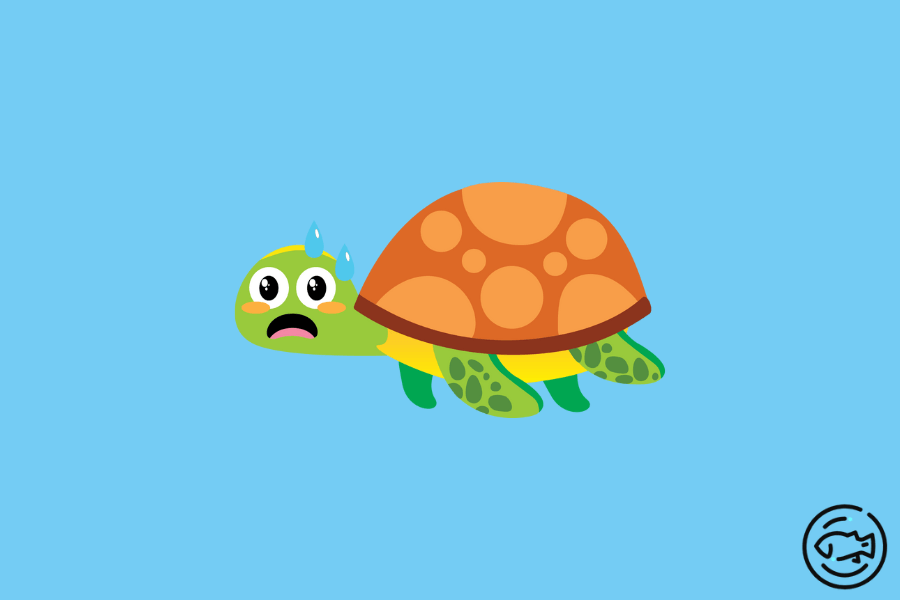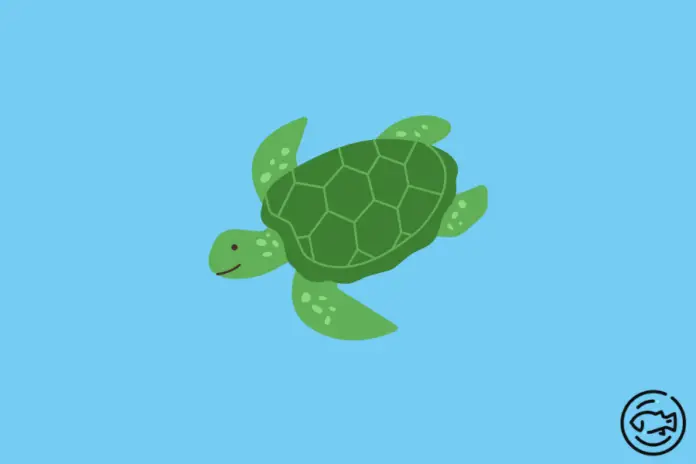Turtle poop can vary considerably in appearance, depending on the type of turtle and its diet. However, a healthy turtle poop is usually brown or dark green and relatively soft in texture.
Turtles are amazing creatures with complex and fascinating life cycles. From the time they are born until the time they die, their bodies go through many changes, and as they grow and develop, their poop changes too!
It should not be too soggy or watery, nor should it be excessively dry or hard. The shape can vary but is often log-shaped or tubular and may contain unprocessed food items such as seeds.
Turtle and tortoise poop can tell a lot about their health and diet. It is a helpful tool for monitoring your pet’s health and can even help you diagnose problems early on.
The consistency and appearance of the poop can give you clues about dehydration, digestive problems, or other health issues.
A change in these factors is a warning sign that something may be wrong, and you could take your pet to the vet for a general check-up.
A turtle poop is a helpful insight into your pet’s health, so understanding what is normal for your turtle and what is not is an essential part of being a responsible turtle owner.
Some turtles, such as box turtles, have a primarily vegetarian diet. These turtles usually have fibrous, green poop that contains bits of undigested plant matter.
Other turtles, such as slider turtles, have a diet that is mostly meat and usually has firmer, lighter poop that holds together in a coil.
Sea turtles have a predominantly seafood diet, so their poop is usually soft, dark green poop that smells fishy.
Turtle poop can also vary in color, depending on the food they have been eating. If a turtle has been mainly eating dark green vegetables, its poop will be a dark green color.
If a turtle has been mainly eating white or pale-colored foods, its poop will be white or pale color.
It is essential to note that a change in diet can cause a difference in the color of a turtle’s poop.
If you change your turtle’s diet, observe its poop closely for any changes in color or consistency.
That said, let’s take a closer look at what different colors of turtle poop may mean.
Black Turtle Poop
Black turtle poop can signify internal bleeding or a digestive blockage. The blockage may be caused by an alien object, such as a piece of shell or plant material, or by an internal tumor.
Sharp things can cause harsh damage to the turtle’s intestines, so any foreign objects in the poop should be removed immediately.
In these scenarios, internal hemorrhaging causes the turtle’s blood to mix with its feces, resulting in black-colored poop.
If the blockage is not severe, the turtle may be able to pass it on its own. However, if the blockage is severe or the turtle is showing other signs of illness, such as lethargy or lack of appetite, it should be seen by a veterinarian.
Turtle poop that is black and tarry may also indicate liver disease. The liver is accountable for filtering toxins out of the blood, and when it is not operating appropriately, these toxins build up in the turtle’s system and are excreted in the feces.
The color change may be temporary, possibly due to a change in diet or stress, and is not necessarily indicative of a severe health problem.
However, if the turtle’s poop remains black for extended periods or the turtle shows other signs of sickness, then a trip to the vet is warranted.
White Turtle Poop
You may be worried if you see your turtle’s poop is white since it is not the color and consistency you are used to of a healthy turtle poop.
However, white turtle poop is not always a cause for concern. In most cases, this is due to urate, a normal part of turtle urine and feces.
Urates are white, chalky, and have a gritty texture. They are high in uric acid, which is a waste product that is excreted through the urine.
When turtles defecate, they also expel urate in their feces. Urate is formed when uric acid crystallizes in the bladder and cloaca (the exit for the digestive and urinary tracts).
If your turtle’s poop is mostly urates with only a small amount of feces, it is nothing to worry about. However, if your turtle’s poop is all urate or the amount of urate in the feces is disproportionate, it could be a sign of dehydration.
Dehydration can be caused by a lack of fresh, clean water, not enough humidity, or too much heat. If your turtle is dehydrated, it will need to be seen by a veterinarian so they can provide proper treatment.
Urates can vary in color, from white to yellow, depending on the type of food the turtle has been eating and the hydration level. If your turtle’s poop is mostly urates, it is a good idea to offer them a shallow dish of water to soak in to help increase their hydration.
It is also worth noting that white poop is entirely normal for terrestrial turtles as they do not ingest much water, so their poop will be drier.
Green Turtle Poop
Green turtle poop is usually a sign of a healthy turtle. If your turtle’s poop is mostly green with a few brown or dark green areas, they are likely eating a healthy diet of vegetables and fruits. A healthy turtle’s poop should not have a strong smell.
The green color is because of the existence of chlorophyll, which is a pigment found in plants. Chlorophyll aids in the turtle’s digestion of plant material and gives the feces its green color.
A small amount of white or light-colored poop is normal, as this may be undigested calcium or other minerals.
Brown Turtle Poop
Brown Turtle Poop can be normal, but it can indicate that your turtle is not getting enough fiber in their diet. Fiber is vital for turtles because it helps them digest their food properly.
If your turtle’s poop is mostly brown, you may want to consider adding more leafy greens and vegetables to their diet.
It would be best to ensure that your turtle has access to a clean, freshwater source. Drinking plenty of water helps turtles flush toxins and waste from their system.
If your turtle’s poop is brown and watery, it may indicate dehydration. In this case, you should offer your turtle more water and ensure they are not taking too much salt from its diet.
How Often Should I Expect To See Turtle Poop?

Turtle poop can vary in frequency, depending on the type of turtle and its diet.
Aquatic turtles, like red-eared sliders and smudged turtles, tend to defecate more frequently than terrestrial turtles, such as box turtles.
A healthy adult turtle should defecate at least once a week, but some turtles may poop more or less often than this.
Baby turtles and juveniles may defecate more frequently since they grow and have a higher metabolism.
Turtles over the age of 20 may defecate less often as their metabolism slows down.
A change in the frequency of your turtle’s poop can signify illness, so it is important to know how often your turtle typically defecates.
If you detect a change in the frequency or consistency of your turtle’s poop, it is a fine thought to take them to the vet for a check-up.
My Turtle Has Diarrhea

As mentioned earlier, a healthy turtle’s poop should be firm and moist but not watery. It should be solid enough that it holds its shape when scooped up.
If your turtle’s poop is watery, this could be a sign of diarrhea.
Diarrhea can be induced by several things, including infection, stress, poor diet, or intestinal parasites.
Infection:
Underlying diseases and infections can cause diarrhea in turtles. Fungal and bacterial infections are common in turtles, leading to lethal problems like shell rot if left untreated.
You may also witness other symptoms of illness, such as lethargy, loss of appetite, abnormal behavior, and diarrhea.
Intestinal parasites:
Intestinal parasites are another typical cause of diarrhea in turtles.
These parasites can be contracted from contaminated water or food and live in the turtle’s intestines, causing irritation and inflammation.
In severe cases, parasites can cause blockages in the intestines, which can be fatal.
Poor Diet:
Foods too high in fat or protein can also cause diarrhea in turtles.
Turtles need a mostly plant-based diet with a small amount of high-quality protein.
Feeding your turtle too many pellets or commercial foods can cause gastrointestinal problems.
A lot of fruits may also loosen your turtle’s stool.
Stress:
Like humans, turtles can experience stress, which can lead to diarrhea.
Stress can be driven by several things, including changes in the environment, such as a new tankmate or an illness.
If your turtle seems stressed, you may want to consider taking them to the vet for a check-up.
Conclusion
Turtle poop can vary in frequency, color, and consistency, depending on the type of turtle and its diet.
A healthy turtle’s poop should be firm and moist but not watery. If you detect a change in the frequency or consistency of your turtle’s poop, a trip to the vet is in order.
Diarrhea can be caused by infection, intestinal parasites, poor diet, or stress. If your turtle has diarrhea, you should take them to the vet for a check-up.


